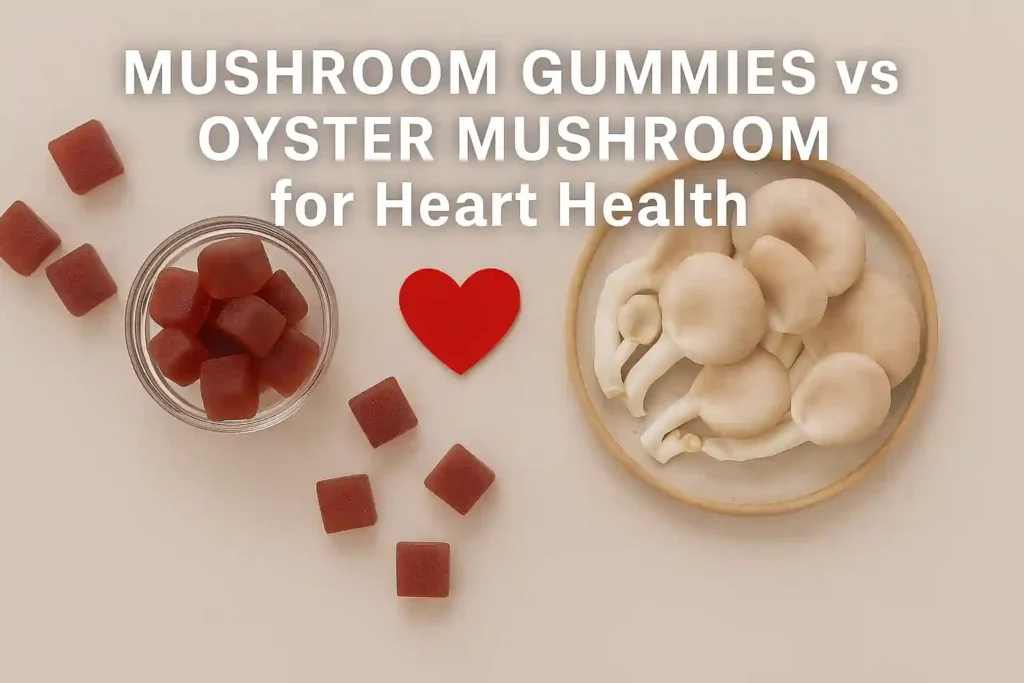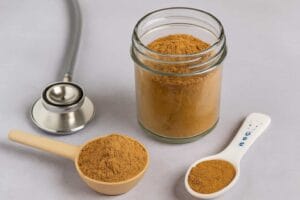When it comes to natural supplements for cardiovascular wellness, many people are turning their attention to mushrooms. The debate between Mushroom Gummies vs Oyster Mushroom for Heart Health is gaining traction as more individuals seek effective and convenient ways to support their heart. Both options offer unique benefits, but understanding their differences can help you make an informed choice. In this article, we’ll explore the heart-healthy properties of mushroom gummies and oyster mushrooms, highlighting their nutritional profiles, mechanisms of action, and overall impact on cardiovascular health.
Mushroom Gummies vs Oyster Mushroom for Heart Health: An In-Depth Comparison
When it comes to natural supplements for cardiovascular wellness, many people are turning their attention to mushrooms. The debate between Mushroom Gummies vs Oyster Mushroom for Heart Health is gaining traction as more individuals seek effective, convenient, and natural ways to support heart function. Both options offer unique nutritional compounds and mechanisms that benefit cardiovascular health, helping you choose the best fit for your lifestyle.
What Are Mushroom Gummies?
Mushroom gummies are dietary supplements that typically contain extracts from various medicinal mushrooms, such as reishi, lion’s mane, chaga, or cordyceps. These gummies are designed for convenience and ease of consumption, often flavored to mask the earthy taste of mushrooms. They are formulated to deliver concentrated doses of bioactive compounds like beta-glucans, antioxidants, and polysaccharides, all of which contribute to cardiovascular health.
For example, reishi mushroom extracts—commonly found in gummies—have been studied for their anti-inflammatory and cholesterol-lowering effects, which are vital for maintaining healthy arteries and preventing heart disease. To learn more about the cancer-fighting benefits of reishi mushrooms, which also tie into their anti-inflammatory properties, check out our detailed guide on Reishi Mushroom for Fighting Cancer.
Understanding Oyster Mushrooms and Their Heart Benefits
Oyster mushrooms (Pleurotus ostreatus) are widely consumed edible mushrooms known for their delicate flavor and nutritional value. Unlike supplements, oyster mushrooms are a whole food source, rich in fiber, vitamins (especially B-complex), minerals like potassium, and unique compounds such as lovastatin—a natural statin that can help reduce cholesterol levels.
Regular consumption of oyster mushrooms has been linked to improved lipid profiles, reduced blood pressure, and enhanced antioxidant defenses, all crucial for heart health. Their natural composition offers a holistic approach to cardiovascular wellness, combining dietary fiber and heart-friendly nutrients in a single food item.
Key Nutritional Components Impacting Heart Health
| Nutrient/Compound | Mushroom Gummies | Oyster Mushrooms | Heart Health Benefits |
|---|---|---|---|
| Beta-glucans | Concentrated extracts | Present in smaller amounts | Lower LDL cholesterol and improve immune response |
| Lovastatin | Usually absent | Natural source | Helps reduce cholesterol synthesis |
| Antioxidants | High concentration depending on mushroom type | Moderate levels | Protects arteries from oxidative damage |
| Potassium | Variable, depends on formulation | Rich source | Regulates blood pressure |
| Fiber | Low or none | Good source | Supports healthy cholesterol levels and digestion |
Pros and Cons: Mushroom Gummies vs Oyster Mushroom for Heart Health
- Mushroom Gummies
- Pros: Convenient, standardized dosages, often enhanced with multiple mushroom extracts, easy to incorporate into daily routine.
- Cons: May contain added sugars or fillers, lack dietary fiber, potentially more expensive than whole mushrooms.
- Oyster Mushrooms
- Pros: Whole food with natural nutrients, rich in fiber and potassium, supports overall diet quality, affordable and versatile in cooking.
- Cons: Requires preparation and cooking, nutrient amounts can vary based on freshness and source, less concentrated bioactive compounds compared to extracts.
How They Work to Support Cardiovascular Health
Both mushroom gummies and oyster mushrooms contribute to heart health but via slightly different mechanisms:
- Cholesterol Management: Oyster mushrooms contain lovastatin, which can naturally inhibit cholesterol production in the liver. Mushroom gummies, depending on their formulation, often contain beta-glucans and antioxidants that help lower LDL cholesterol and prevent plaque buildup.
- Anti-inflammatory Effects: Chronic inflammation is a significant risk factor for heart disease. Mushroom gummies with reishi or chaga extracts are particularly known for their anti-inflammatory properties, which help reduce arterial inflammation.
- Blood Pressure Regulation: Potassium-rich oyster mushrooms help regulate blood pressure by balancing sodium levels in the body. Some mushroom gummies may also support vascular health through antioxidant activity.
- Antioxidant Protection: Both forms provide antioxidants that combat oxidative stress, a key contributor to endothelial dysfunction and atherosclerosis.
If you are interested in other mushroom-based supplements that support skin and overall health, consider exploring our evidence-based overview of Mushroom Capsules for Skin Rejuvenation for Beginners.
Which Option Should You Choose?
The choice between mushroom gummies and oyster mushrooms largely depends on your lifestyle, dietary preferences, and health goals.
- For Convenience: Mushroom gummies offer a simple, no-prep way to get heart-supporting compounds, especially if you’re on the go or dislike the taste of mushrooms.
- For Whole Food Benefits: Oyster mushrooms provide fiber, minerals, and a natural statin effect, making them a great addition to a heart-healthy diet.
- For Targeted Therapy: If you want concentrated doses of specific medicinal mushrooms like reishi or chaga, gummies or capsules might be more effective.
Ultimately, combining both approaches can be highly beneficial. Including Mushroom Gummies vs Oyster Mushroom for Heart Health in your routine allows you to enjoy the natural nutrients of oyster mushrooms with meals while supplementing with mushroom gummies for targeted cardiovascular support.
F.A.Q
- What are the main differences between mushroom gummies and oyster mushrooms for heart health?
Mushroom gummies typically contain concentrated extracts of medicinal mushrooms, offering standardized doses of bioactive compounds like beta-glucans and antioxidants. Oyster mushrooms, on the other hand, are whole foods rich in fiber, potassium, and natural lovastatin, providing a more holistic nutritional profile. Both support heart health but through slightly different mechanisms. - Can mushroom gummies replace eating oyster mushrooms for cardiovascular benefits?
While mushroom gummies provide convenient and concentrated doses of heart-supporting compounds, they usually lack the dietary fiber and natural statins found in oyster mushrooms. For optimal heart health, it’s best to include both whole mushrooms in your diet and supplements if needed. - Are there any side effects of taking mushroom gummies or consuming oyster mushrooms?
Both are generally safe for most people when consumed in recommended amounts. However, some individuals may experience allergic reactions or digestive upset. It’s advisable to consult a healthcare provider if you have mushroom allergies or are on medications, especially blood thinners. - How do mushroom gummies and oyster mushrooms help lower cholesterol?
Oyster mushrooms contain lovastatin, a natural compound that inhibits cholesterol synthesis in the liver. Mushroom gummies often contain beta-glucans and antioxidants, which help reduce LDL cholesterol and prevent arterial plaque buildup, contributing to improved heart health. - What are the health benefits of Oyster mushrooms according to WebMD?
Oyster mushrooms (Pleurotus ostreatus) are a popular edible fungus known for their delicate flavor and rich nutritional profile. They may help support heart health, lower cholesterol, and provide important antioxidants that protect the body from oxidative stress. You can learn more about their nutritional benefits on the WebMD health guide. - Mushroom Gummies vs Oyster Mushroom for Heart Health
When comparing Mushroom Gummies vs Oyster Mushroom for Heart Health, both can offer valuable benefits depending on how they’re used. Oyster mushrooms naturally contain compounds that may help lower cholesterol and improve cardiovascular function, while mushroom gummies provide a convenient way to get similar nutrients in a controlled dose. However, whole mushrooms generally retain more fiber and antioxidants, making them a more complete heart-friendly option. For best results, a balanced diet including both natural mushrooms and quality supplements is recommended.



